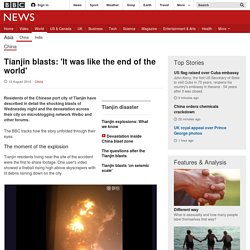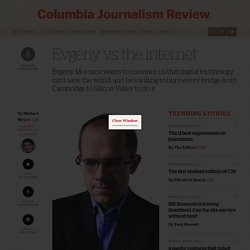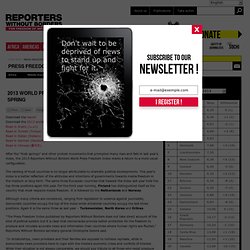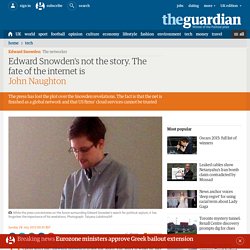

Tianjin blasts: 'It was like the end of the world' Residents of the Chinese port city of Tianjin have described in detail the shocking blasts of Wednesday night and the devastation across their city on microblogging network Weibo and other forums.

The BBC tracks how the story unfolded through their eyes. The moment of the explosion Tianjin residents living near the site of the accident were the first to share footage. One user's video showed a fireball rising high above skyscrapers with lit debris raining down on the city. Many described it as an apocalyptic scene, with user Upright Teenager, saying: "There were three explosions, it was like the end of the world.
" Tianjin student I'm A Flying Superhero shared these photos of the blast near her home. Residents fled to the streets in shock and many uploaded images of people wandering about in a daze with a hazy, fluorescent sky lit up by the explosions. "I'm still alive," were the simple words of Little Five Crazy. It was felt far and wide through the city Residents started offering help. Evgeny vs. the internet. (Philip Habib) Depending on whom you ask, Evgeny Morozov is either the most astute, feared, loathed, or useless writer about digital technology working today.

Just 29 years old, from an industrial town in Belarus, he appeared as if out of nowhere in the late aughts, amid the conference-goers and problem solvers working to shape our digital futures, a hostile messenger from a faraway land brashly declaring the age of big ideas and interconnected bliss to be, well, bullshit. To say that Morozov has gone out of his way to irritate powerful and influential people in the tech world doesn’t quite capture it. Doing so is his primary occupation. Or try this passage. The entire Morozov aesthetic is in this sentence: the venom, the derision, the reverse jujitsu of his opponents’ sanctimony, the bald accusation that all the talk about a new age of human flourishing is nothing but an attempt to vamp the speaker’s consulting business.
Morozov is a heretic in this world. Talking nonsense. Press Freedom Index 2013. Download the reportDownload the 2013 world press freedom mapRead in Arabic (بالعربية)Read in Turkish (Türkçe)Read in Italian (Italiano)Read in German (Deutsch)Read in Chinese (看中文) After the “Arab springs” and other protest movements that prompted many rises and falls in last year’s index, the 2013 Reporters Without Borders World Press Freedom Index marks a return to a more usual configuration.

The ranking of most countries is no longer attributable to dramatic political developments. This year’s index is a better reflection of the attitudes and intentions of governments towards media freedom in the medium or long term. The same three European countries that headed the index last year hold the top three positions again this year. For the third year running, Finland has distinguished itself as the country that most respects media freedom. From top to bottom The Nordic countries have again demonstrated their ability to maintain an optimal environment for news providers. Big rises... Edward Snowden's not the story. The fate of the internet is.
Repeat after me: Edward Snowden is not the story.

The story is what he has revealed about the hidden wiring of our networked world. This insight seems to have escaped most of the world's mainstream media, for reasons that escape me but would not have surprised Evelyn Waugh, whose contempt for journalists was one of his few endearing characteristics. The obvious explanations are: incorrigible ignorance; the imperative to personalise stories; or gullibility in swallowing US government spin, which brands Snowden as a spy rather than a whistleblower. In a way, it doesn't matter why the media lost the scent.
What matters is that they did. Similarly, without Snowden, we would not be debating whether the US government should have turned surveillance into a huge, privatised business, offering data-mining contracts to private contractors such as Booz Allen Hamilton and, in the process, high-level security clearance to thousands of people who shouldn't have it.
That's all at nation-state level. 2013 World Press Freedom Index. (Page 1 of 18) - Journalists as Peacekeeping Force? authored by Hanitzsch, Thomas.
Images/uploads/media_development_indicators_framework_ENG.pdf.